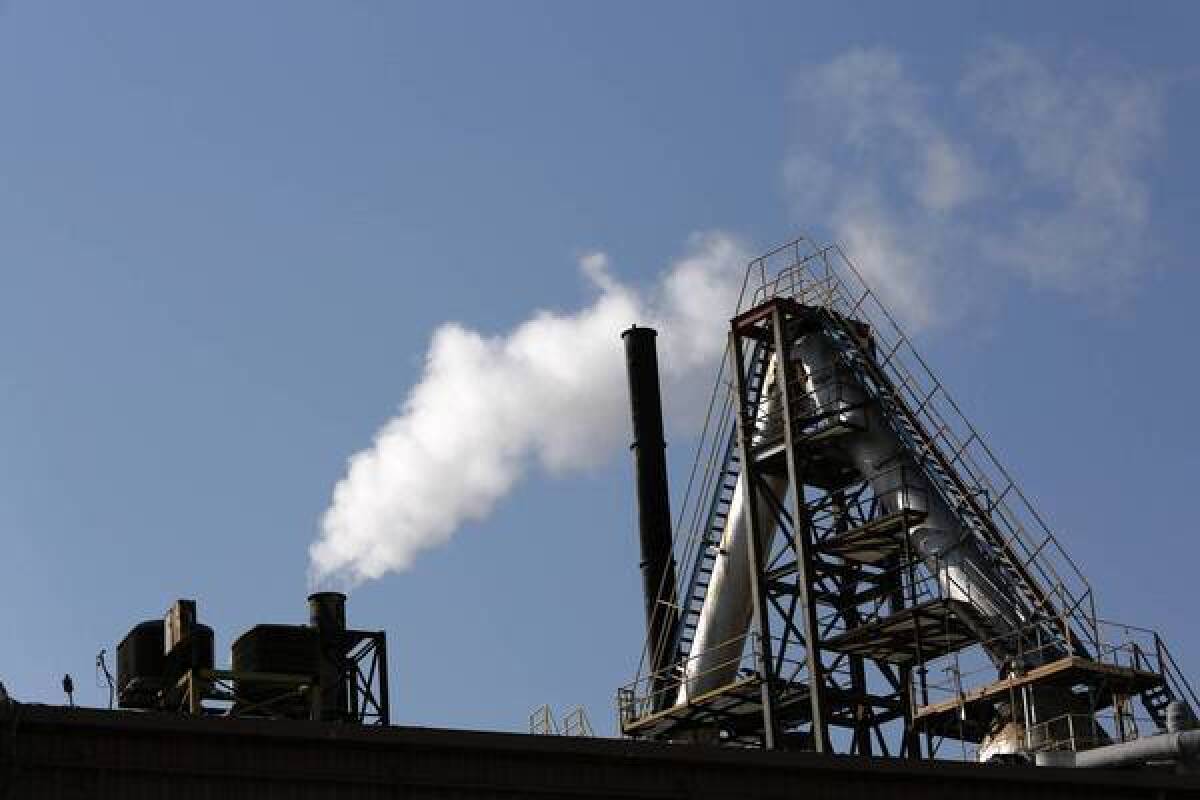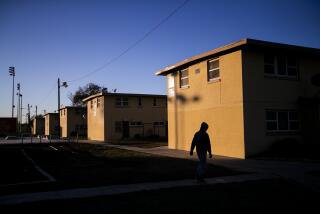Value of blood tests near Exide recycling plant questioned

Los Angeles County’s plan to offer blood tests for lead poisoning to hundreds of thousands of people in southeast Los Angeles was greeted as a political victory in working-class communities that have long worried about the health effects of emissions from a Vernon battery recycler.
Less clear is what the tests will accomplish.
Some activists say the testing is coming too late — that the best time would have been five years ago, when lead emissions from the recycler, Exide Technologies, were so high that the Southern California Air Quality Management District forced it to temporarily cut production. Since then, officials have said lead air emissions have fallen substantially.
The testing isn’t part of a scientific study but a public service for anyone who wants it. That will be of little use in tracing any high lead levels back to a particular source or showing that the plant caused any harm. There are multiple sources of lead, and in communities such as Boyle Heights, Maywood and Huntington Park, the housing stock is old and full of lead paint.
Blood levels are a good measure of lead exposure in the previous four months, but they are not as reliable for looking at chronic exposure. Lead can accumulate in the bones and remain there for decades, though some does seep into the bloodstream. Bones can be sampled for lead content, but such tests are difficult and costly.
And though the scope of the testing is potentially vast — Centers for Disease Control and Prevention spokeswoman Bernadette Burden called the possible magnitude “unprecedented” — it is unclear how many people will take advantage of it .
Bell City Councilman Nestor Valencia called the effort “a PR stunt” because, he noted, it will largely measure acute exposure, not cumulative effects from living near a smelter for years. The real agenda, he charged “is to say that everything is fine,” whether or not that’s true.
“I live in the city of Bell,” which was recently consumed by corruption allegations, he said. “Do you think I trust the government?”
But others, including Judith Ballez, 28, of Maywood, welcomed the testing as a chance to address long-standing fears about living so close to the city of Vernon and its many sources of industrial pollution.
Until she heard Friday morning about the blood tests, Ballez said, she had had no idea her family might have been exposed to lead or arsenic from Exide, which is about two miles from her home. She said she has long noticed noxious odors coming from various companies.
She said when she’s outside with her 3-year-old son, Emiliano, she constantly worries about what’s in the air.
“I always wonder how it is affecting us,” she said. “If there’s an opportunity to check, yes, we are.”
The testing, which was announced Thursday, could begin as soon as next month. Exide officials declined to comment.
Community concern about Exide has been mounting since spring, when The Times reported that air regulators found that elevated arsenic emissions from the plant increased the cancer risk for more than 110,000 people. Officials said this week that it is not doing blood tests for arsenic, a carcinogen, because such tests can be unreliable and complicated.
“Such testing would not provide meaningful information to help us evaluate Exide’s possible impact on the community,” said Brian Johnson, deputy director for the state toxic-control department’s Hazardous Waste Management Program.
Johnson said regulators have begun dust testing and will soon begin soil tests for lead and arsenic. Citing confidential discussions with Exide, he declined to say more.
The plant has been repeatedly cited by the air district and the state Department of Toxic Substances Control for discharging potentially harmful quantities of lead.
After the air district first revealed the elevated cancer risk, officials from the state toxic-control department moved to temporarily suspend plant operations. But Exide appealed in Los Angeles County Superior Court, arguing that the plant did not pose “an imminent and substantial” danger to the public. A judge sided with the company, and it resumed operations.
Exide has agreed to pay for the blood tests and for soil and dust tests, according to officials. But spending for the blood tests still must be approved by a bankruptcy court judge. The Georgia-based company, one of the largest battery recyclers in the world, filed for bankruptcy this summer.
If the court does not approve the expenditure, state toxics officials said they will seek to require it as a condition for permitting the Exide plant to operate.
The country has made enormous progress in recent decades reducing public exposure to lead, thanks largely to the removal of lead from gasoline and paint.
The U.S. Centers for Disease Control and Prevention considers levels above 5 micrograms per deciliter to be “elevated” in children, though research has shown that lead can impair development in lower concentrations. It can cause learning disabilities. Adults are far less sensitive to lead.
Exide has been down the path of mass blood-testing before.
In March 2011, the state health department in Texas offered blood testing for lead exposure to residents near an Exide battery recycling plant in Frisco that was in violation of federal air quality standards for the metal.
Blood samples were collected over four days.
The results: Of 608 samples analyzed by health authorities, 575 did not contain detectable levels of lead, the state reported. Two participants — both adults — had blood lead levels greater than 10 micrograms per deciliter. The highest was 15.
In addition, 12 people had levels below 10 but higher than would be expected based on their ages.
While those results allayed some fears, they could not answer the central question of whether the Exide facility had caused any harm. Not enough people were tested, and those who were did not necessarily live in the neighborhoods most at risk, based on proximity to the plant and wind patterns. Children are most vulnerable to the dangers of lead, but about two-thirds of the volunteers were adults, the Dallas Morning News reported at the time.
Experts said that only a costly and extensive epidemiological study could assess the actual risk. Such a study would compare lead levels in representative samples of people living various distances from the plant.
Dr. Richard Jackson, a UCLA pediatrician and former head of environmental health at the CDC, said that looking for lead in people made the most sense only after levels had been studied in the air, soil and water.
When industry is paying for the effort, outside oversight is particularly important, he said.
Still, even many longtime critics of Exide and the regulators who have overseen it praised the Los Angeles County plan.
“I think it’s a great idea,” said Jane Williams, executive director of California Communities Against Toxics. “It will give some indication of what people may be exposed to.”
Times staff writer Anna Gorman contributed to this report.
More to Read
Sign up for Essential California
The most important California stories and recommendations in your inbox every morning.
You may occasionally receive promotional content from the Los Angeles Times.












